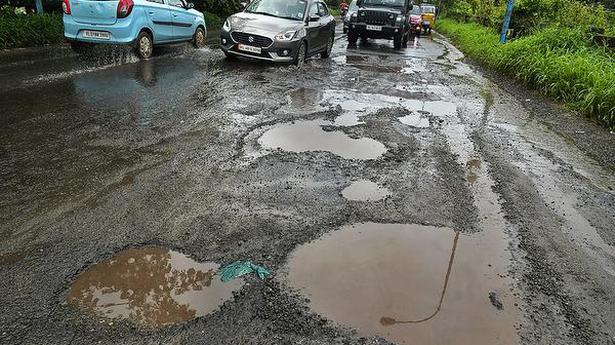A view of the Moolampilly Island in Kochi. Displaced families on the island demand that rehabilitation plots allotted to them at Thuthiyoor near Kakkanad be made habitable.
| Photo Credit: H. VIBHU
The wounds of being forcibly evicted from her house, which was then demolished with an excavator before her very eyes, were still fresh in Mary Francis’ memory when, at the age of 60, she chose to contest from the Ernakulam Parliament constituency in 2009.
Ms. Francis was among the ten families forcibly evicted from Moolampilly in Kadamakkudy panchayat on February 6, 2008 to make way for rail and road connectivity to the Vallarpadam International Container Transshipment Terminal (ICTT). Contesting as an Independent, she finished fifth with over 3,000 votes. But it was not a battle she fought to win but to make a point, which she did.
“Political parties were selling our tears to win votes. So, I thought why not front our own cause and tell people directly about our plight. We were thrown out under a British-era land acquisition law, with negligible compensation and no rehabilitation,” said Ms. Francis. She was no stranger to electoral politics, having won from the Moolampilly ward in the local body polls in 1988, one of the first women to achieve that feat. Yet, the Parliament campaign left her with a sour taste as she often felt like an outcast in a society largely indifferent to their suffering.
The acquisition of land for ICTT connectivity displaced 316 families across seven villages spanning three Assembly constituencies—Kalamassery, Ernakulam, and Vypeen—and six local bodies: Kochi Corporation, Kalamassery and Eloor municipalities, and Mulavukad, Cheranalloor and Kadamakkudy panchayats. Though the Left Democratic Front government led by former Chief Minister V.S. Achuthanandan had notified a rehabilitation package, it is yet to be implemented in letter and spirit.
Since their eviction, the displaced families have adopted different approaches towards elections. “In 2014, families boycotted the Parliament election, while five years later, they did vote but not before collectively marching to the polling booths to draw attention to their cause. This time, their primary demand is to make the two rehabilitation plots for over 150 families in Thuthiyoor near Kakkanad habitable, and they will support whoever backs it in the coming election,” said Francis Kalathungal, general convener of Moolampilly Coordination Committee.
But many remain disheartened after years of neglect. “Every political front keeps selling its development achievements and promises of future progress. What about the victims of the development they celebrate? Everything has turned digital except governance. Three months after the last meeting of the monitoring committee chaired by the District Collector to oversee the rehabilitation package, the authorities could not even provide us with a signed copy of the minutes. That is red-tapism for you in this digital era,” said V.T. Wilson, 60, an evictee.
P.S. Suresh, once an active worker for the Left who even survived a stabbing before leaving the movement in the 1990s, lost his house at Mulavukad along with 14 other families. He has still not been able to transfer the registry or fix the fair value of his five-cent rehabilitation plot. “I have stopped voting. What is the point when no political party is interested in ensuring justice for us,” asked Mr. Suresh.
Published – November 19, 2025 10:10 pm IST



